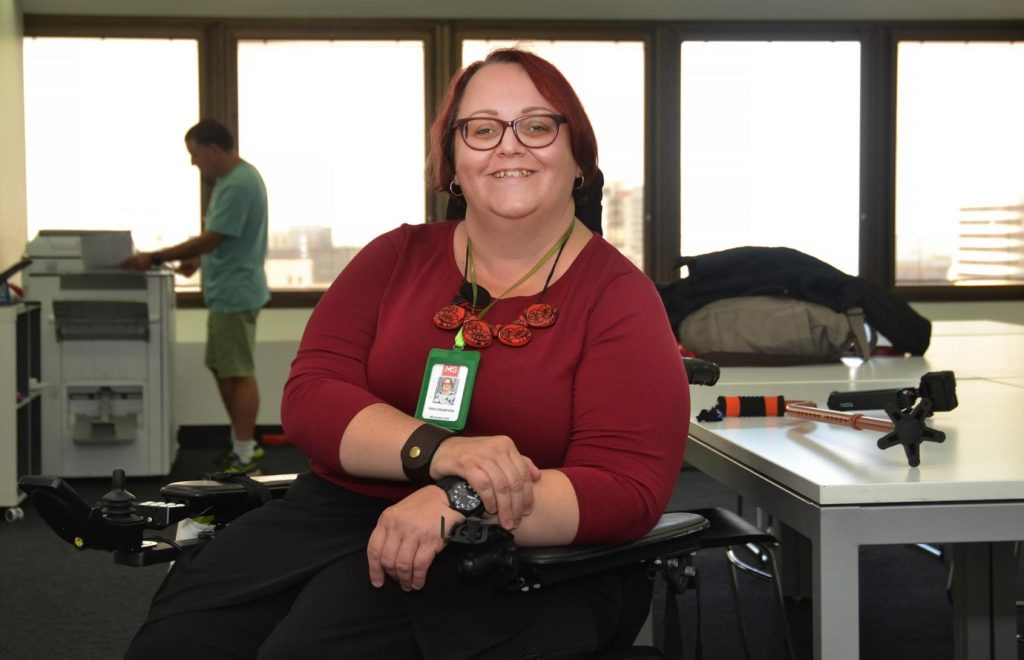According to the World Health Organisation, 15 per cent of the world’s population are living with disability. Nearly half of these, or about 450 million people, are living with a mental or neurological condition, which can often be invisible to others.
I make up one of these 450 million people.
I was diagnosed with a neurological disease called Multiple Sclerosis, most commonly known as MS, when I was 32 years old.
MS derailed my life at the point of diagnosis. I lost my home, my job and it impacted greatly on my ability to sustain meaningful relationships with others. Friendships have been tested and ultimately many fell by the wayside.
In a matter of 5 years, my disease has progressed from needing to use a walking stick to a mobility scooter and now I use a power wheelchair.
Lassitude fatigue would be the worst symptom I live with on a day-to-day basis and it has meant energy for me is a currency more precious than gold. Fatigue means that I must delegate out all non-essential tasks, for example housework and cooking, so I have the energy I need to go to work and live a productive life.
Nevertheless I am resilient, and I have worked extremely hard to rebuild my life with the mantra of “Accept, Adapt and Overcome”. I am now working as an NDIS Support Coordinator using my lived experience of disability to support others to achieve their life goals. I live in a wheelchair accessible home and I have an active social life.

It’s near impossible to truly imagine how any disability, particularly those that are less visible, impact every aspect of someone’s life. This makes it hard for others to understand life from this perspective.
In Australia alone, 4.4 million people are living with disability and often have difficulty expressing how it feels.
This week was International Day of People with Disability (IDPWD), a United Nations observed day celebrated internationally, to increase public awareness, understanding and acceptance of people with disability.
In-line with IDPWD and in an effort to build awareness of how some individuals experience their disabilities, especially invisible ones, I collaborated with the disability support platform I use, Mable, to produce a podcast reflecting the personal lived experience of disability.
‘The Invisible Podcast’ includes four episodes each immersing the listener into a deep sensory experience of the unique circumstances of how it feels to live with that particular disability, including my experience with MS, Robert’s experience with Autism Spectrum Disorder, Gabrielle’s experience with Psychosis and Tina’s experience with Chronic Fatigue Syndrome.
Each of us described in detail the physical, mental and emotional effects of our disability, helping to construct the multi-sensory podcast scripts and direct soundscapes that reflect what we experience when living on a day-to-day basis.
Sounds associated with the fatigue, concentration difficulties and cognitive impairment that surround my everyday can be heard in my episode – Episode 1: The Disarrangement.
The results are so visceral and true to the experience of Multiple Sclerosis, that it was actually difficult for me to listen to. I actually hope it is difficult for others to hear too, so they can start to understand the impact of invisible disabilities on those who live with them.
The podcast is one of the first resources I have come across that intend to help others experience what I experience every day. Living with a disability, like 1-in-5 Australians do, can already make aspects of life significantly more challenging and this is only made more isolating when others find it difficult to understand what the experience is like.
Understanding a person’s experience of disability is the first step to better inclusion in the community. Through the creation of ‘The Invisible Podcast’, I hope others can gain a small insight into what it is truly like for me.
A five-minute experience listening to my episode might be jarring for some, but ultimately the episode could ensure better outcomes for those living with disability, like me, in the community.

